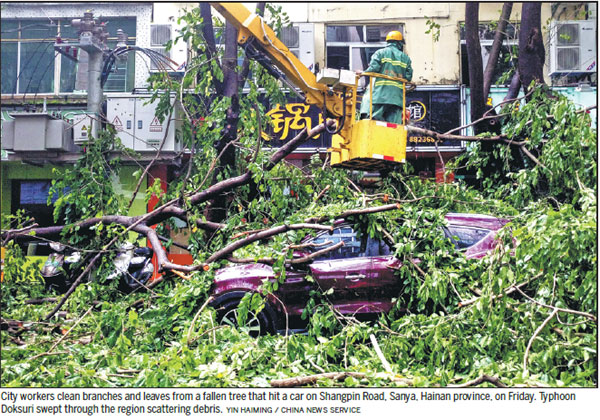


Binary typhoons Talim and Doksuri passed eastern China's Zhejiang and Fujian provinces, and South China's Hainan province on Friday before heading to Japan and Vietnam.
Doksuri, the 19th typhoon this year, brought huge gales and heavy rain to coastal areas in South China on Friday, and the China Meteorological Administration continued to issue a yellow alert for Doksuri on Friday.
Nearly 217,000 people in Zhejiang and Fujian were evacuated to safety under government arrangements, according to Office of State Flood Control and Drought Relief Headquarters.
In Hainan, Sanya Phoenix International Airport said it canceled a total of 178 flights on Thursday and Friday.
Zhang Ling, chief forecaster at the meteorological administration, said on Friday that 19 typhoons had formed around the world this year, 2.8 more than the average in the same period in past years, and 13 had appeared since July - six in late July, four in late August, and three this month.
Seven of them made landfall in China. In just three weeks, since Aug 23, five typhoons had made landfall or affected China. Typhoon Hato heavily lashed Guangdong province, Hong Kong and Macao, resulting in eight deaths in Macao and huge economic losses.
"We are still in the active phase of typhoons, so it's expected that there will be a certain number of additional typhoons before the end of this year, but fewer than now," Zhang said.
Asked about the reason for the frequent windstorms near China since July, meteorological experts said there's no reliable data indicating they were related to global warming.
Xu Ming, a researcher at the meteorological administration's Shanghai Typhoon Institute, said that although it makes sense from the physics point of view that global warming can lead to more windstorms by increasing the water vapor in the atmosphere, which would reinforce tropical depressions, more precise data is needed to support the theory.
"Scientists should make conclusions based on statistics. Up to now, researchers in different countries don't have exact data demonstrating that global warming brings more typhoons. And they cannot reach consensus on it," Xu said.
 Fire brigade in Shanghai holds group wedding
Fire brigade in Shanghai holds group wedding Tourists enjoy ice sculptures in Datan Town, north China
Tourists enjoy ice sculptures in Datan Town, north China Sunset scenery of Dayan Pagoda in Xi'an
Sunset scenery of Dayan Pagoda in Xi'an Tourists have fun at scenic spot in Nanlong Town, NW China
Tourists have fun at scenic spot in Nanlong Town, NW China Harbin attracts tourists by making best use of ice in winter
Harbin attracts tourists by making best use of ice in winter In pics: FIS Alpine Ski Women's World Cup Slalom
In pics: FIS Alpine Ski Women's World Cup Slalom Black-necked cranes rest at reservoir in Lhunzhub County, Lhasa
Black-necked cranes rest at reservoir in Lhunzhub County, Lhasa China's FAST telescope will be available to foreign scientists in April
China's FAST telescope will be available to foreign scientists in April "She power" plays indispensable role in poverty alleviation
"She power" plays indispensable role in poverty alleviation Top 10 world news events of People's Daily in 2020
Top 10 world news events of People's Daily in 2020 Top 10 China news events of People's Daily in 2020
Top 10 China news events of People's Daily in 2020 Top 10 media buzzwords of 2020
Top 10 media buzzwords of 2020 Year-ender:10 major tourism stories of 2020
Year-ender:10 major tourism stories of 2020 No interference in Venezuelan issues
No interference in Venezuelan issues
 Biz prepares for trade spat
Biz prepares for trade spat
 Broadcasting Continent
Broadcasting Continent Australia wins Chinese CEOs as US loses
Australia wins Chinese CEOs as US loses